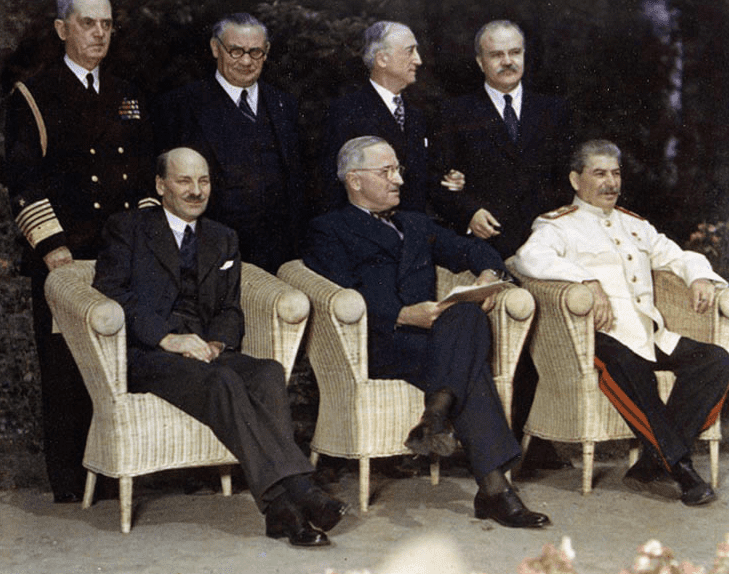

Soviet Premier Joseph Stalin, British Prime Minister Winston Churchill, and President Truman began the conference for their respective countries. Held in a suburb of Berlin, it commenced July 17 lasting to August 2. The Potsdam Conference, a meeting of the victorious leaders of the Allies in Europe, attempted to confront the delicate balance of power of the opposing governmental structures, democracy and communism. Their song was that France would go Communistic, so would Germany, Italy and the Scandinavians, and there was grave doubt about England staying sane." According to several senators that had recently toured postwar Europe in a meeting with President Truman, ". The United States was faced with the realization that the Soviet and communist ideal were gaining increased support across the globe. Truman in July 1945 had begun to look toward the postwar world. The war was nearing an end, but heavy costs of man and might would be needed to secure peace.


Still, the Japanese resolve was hardened, even resolved to fight to the end. Bombing raids coupled with a naval blockade had begun to decimate the Japanese population. It would only be a matter of time (August 15) before the Soviets planned to enter the war. By June, with these victories secure, the United States was in air striking distance of the Japanese mainland. A new job to Harry Truman, the presidency, had been one long struggle after another and he quickly nicknamed the White House the "Great White Jail." The focus of the United States was now on the Pacific as Americans were storming the beaches of Iwo Jima and Okinawa. On May 8, 1945, the Allies accepted German surrender terms at the conclusion of the European conflict of World War II. National History Day Workshops from the National Archives.Electing Our Presidents Teacher Workshop.Collection Policy and Donating Materials.An Ordinary Man, His Extraordinary Journey.
Potsdam conference how to#
But, riven by tensions and dramatic debates over how to end the most recent war, they only dimly understood that their discussions of peace were giving birth to a new global conflict. The final resolutions of the Potsdam Conference, notably the division of Germany and the Soviet annexation of Poland, reflected the uneasy geopolitical equilibrium between East and West that would come to dominate the twentieth century.Īs Neiberg expertly shows, the delegates arrived at Potsdam determined to learn from the mistakes their predecessors made in the Treaty of Versailles. Stalin took advantage of his strong position to demand control of Eastern Europe as recompense for the suffering experienced by the Soviet people and armies. But when the delegates took a recess for the British elections, Churchill was replaced-both as prime minster and as Britain’s representative at the conference-in an unforeseen upset by Clement Attlee, a man Churchill disparagingly described as “a sheep in sheep’s clothing.” When the conference reconvened, the power dynamic had shifted dramatically, and the delegates struggled to find a new balance.

For the first week, negotiations progressed relatively smoothly. The award-winning historian Michael Neiberg brings the turbulent Potsdam conference to life, vividly capturing the delegates’ personalities: Truman, trying to escape from the shadow of Franklin Roosevelt, who had died only months before Churchill, bombastic and seemingly out of touch Stalin, cunning and meticulous. In July of 1945, Harry Truman, Winston Churchill, and Joseph Stalin gathered in a quiet suburb of Berlin to negotiate a lasting peace: a peace that would finally put an end to the conflagration that had started in 1914, a peace under which Europe could be rebuilt. Britain was bankrupt, while Germany had been reduced to rubble. Millions of refugees were dispersed across the continent. The definitive account of the 1945 Potsdam Conference: the historic summit where Truman, Stalin, and Churchill met to determine the fate of post-World War II EuropeĪfter Germany’s defeat in World War II, Europe lay in tatters.


 0 kommentar(er)
0 kommentar(er)
